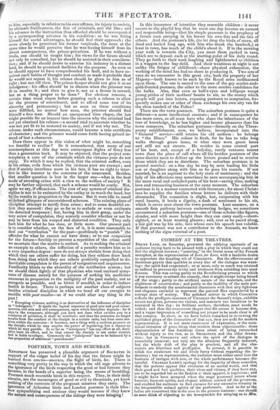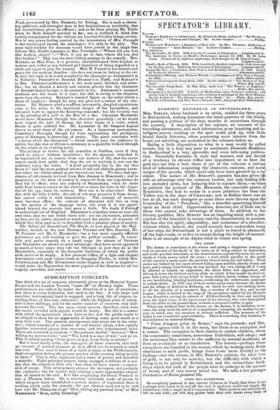COMEDY AT THE THEATRES.
DRURY LANE, on Saturday, presented the edifying spectacle of an audience trying hard to be pleased with a play in which they could not feel the slightest interest ; "assisting," in the literal sense of the French metaphor, at the representation of Love for Love, with a laudable desire to appreciate the dazzling wit of CONGREVE. But the effervescence of licentious gayety that sparkles in every line of the dialogue was want- ing; the spirit had evaporated ; or at most, only so much was retained as sufficed to prevent the levity and briskness from subsiding into utter flatness. This was owing partly to the Bowdlerizing process to which it was necessary to submit the comedy, that it might escape being hissed off the stage ; partly to the artificial nature of the materials, and the slightness of construction ; and partly to the inability of the male per- formers to embody the unsubstantial characters with that airy lightness and elegance essential to represent the painted flies engendered by a corrupt state of society. The polished mirror in which CONGREVE reflects the profligate manners of CHARLES the Second's reign, exhibits scenes too gross, persons too vicious, and manners too licentious to be tolerated in this day : its brilliant surface, therefore, must needs be veiled; and thus the evanescent shapes that flit across it become dim, and a vague impression of something not proper to be made clear is all that remains. In short, as we have before remarked in reviewing the published plays of the dramatists of that age, they are unfit for modern representation. It is not mere coarseness of expression, or the occa- sional intrusion of gross ideas, that renders them objectionable : these characteristics of less fastidious times admit of being retrenched without injury to the rest, as in SHAKSPERE and the elder drama- tists: but in CONGREVE and others the spirit of the dialogue is essentially immoral; not only are the allusions frequently indecent, but the whole drift of the play is prurient, and all the cha- racters are libertines and profligates. In perusal, it is possible to relish the exuberant wit and lively fancy without regarding the in- decency; but on representation, the audience must either enter into the business of intrigue with zest, or the whole performance becomes dis- tasteful. CHARLES LAMB'S apology for the impurity of these comedies, that the persons appear like creatures of an unreal world, and that their good and bad qualities, their vices and virtues, if they have any, are to be regarded but as the fashion or their apparel, is ingenious ; and it might have been accepted when the stage possessed actors whose humour, buoyant spirits, and elegant address carried off the grossness, and enabled the audience to find excuses for any excessive vivacity in the irrepressible animal spirits of the performers. And so far as the ladies are concerned this is the case in the present instance : one should as soon think of objecting to the honeysuckle for straying as to Mrs. Frail, personated by Mrs. NissErr, for flirting. She is such a charm- ing gadabout, and entangles men in her fascinations so inevitably, that her incontinence gives no offence ; and so far from pitying Mr. Tattle when he finds himself married to her, one is inclined to think him luckily compensated for the ridicule his boastful frivolity brings on him. Nor is any grave feeling excited by the inconstancy of Mrs. Foresight to her moon-eyed spouse the astrologer : it's only in the play. The most rigid stickler for decorum would have joined in the laugh that follows Mrs. Frairs rejoinder to Mrs. Foresight—" Where did you lose this bodkin, sister ?"—" Well, if you go to that, where did you find that bodkin?" This was the most telling passage in the comedy. Mrs. KEELEY, as Miss Prue, is a genuine, unsophisticated little hoyden, as wanton and wilful as any forward girl impatient of being regarded as a child and eager to play the woman. Miss H. FAUCIT is too demure and grave for the madcap Angelica : she does not seem to belong to the set. In fact, her style is as much unsuited to the character as ANDERSON'S IS IO Valentine, PHELPS'S to Scandal, HUDSON'S to Tattle, and KEELEY'S IO Ben. PHELPS'S performance is the most quiet, finished, and artist- like ; but he throws a kindly and earnest gravity into the character of Scandal that is foreign to its sarcastic levity. ANDERSON'S assumed madness sets the house in a roar; but this is owing to the situation more than the acting. KEELEY'S comical figure as the sailor elicits a shout of laughter ; though he does not give one a notion of the cha- racter. Mr. HUDSON plied a snuffbox incessantly, dangled a ponderous cane at his wrist, to the imminent danger of the bystanders, and laboured hard to appear the fluttering coxcomb ; but his vivacity was as the grinding of a mill to the flirt of a fan. CHARLES MATHEWS would have skimmed through this character gracefully ; or he would have topped the part of Jeremy, the witty rogue of a valet, which SELBY is quite unfitted for. Mr. LAMBERT in Sir Sampson Legend shows an utter want of the via comica. As a humorous personation, Courros's Foresight, though far from approaching the prodigious gusto of MUNDEN, is deserving of praise. The piece concludes with "a dance of all the characters " ; which usually puts the audience in spirits, but this was as lifeless a ceremony as a quadrille walked through on the carpet at an evening-party. The attempt to revive the old comedies is fruitless, even if they could be played without mutilation : for the manners intended to be represented are so remote from our notions of life, that the actors cannot catch their spirit—had they the art to embody it, nor can the audience enjoy the satire. " A jests' prosperity lies in the ear that hears it," and the most pointed arrows of wit and ridicule glance harm- less when the follies aimed at are beyond our ken. We have had spe- citsens of old comedy revived from BEN JONSON to HoLcaorr ; and in proportion as the state of society is removed from our cognizance do they fail of effect : even the comedy of SHAKSPERE, when he turns aside from human nature in the abstract to shoot his bolts at the foppe- ries of his age, loses its raciness. How can it be otherwise? Satire dies with the folly it kills : the salt of wit may preserve it from decay, but cannot endue it with immortality. The comedy of manners soon becomes effete : the comedy of character will live as long as the species or the language exists, but even it is not appre- ciated beyond the country that gave it birth. We doubt if Faistaff is understood out of England. SHERIDAN'S comedies come so near our own time, that we can relish them still : yet the characters, animated as they are by action, depend so much upon the picture of manners of which they form part as to be identified with a peculiar phase of society. The School for Scandal and The Rivals, as now played at the Hay- market, include in the cast Madame VESTRIS and Mrs. GLOVER, Mr. W. FARBER and Mr. C. MATHEWS; but a few more equally efficient performers are still wanting to give the perfect ensemble. In vaude- ville and petite comedy on a small stage the talents of VESTA'S and MATHEWS are shown to most advantage: they have never appeared so much at home since they left the Olympic as now they do at the Haymarket, especially in the favourite burlettas, of which the public seem never to be weary. A few pleasant trifles, of a light and elegant description—not such vulgar trash as Snapping Turtles, in which Mrs. Frrzwitaxam and Mr. BUCKSTONE excite disgust as well as laughter— would make the Haymarket the most popular of the theatres for all but tragedy, spectacle, and music.



























 Previous page
Previous page